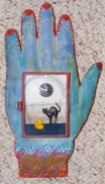Click on photos to enlarge and see commentaries made about some during earlier postings.
Children are the parts of themselves that parents leave behind when they die—actual physical tracings that will last for as long as their line reproduces. Yet, they have no control over what the children add to their genes to pass on down through time. Each generation melds together with the genes of other families to create a new assemblage composed of bits and pieces of the physical and mental characteristics gleaned from each side of the family to form a new identity.
Childless, I have only what I create to carry me forward into the far future—my poems, stories and books as well as the found object collages that I have created over the past eighteen years. In them I leave the tracery of my life—the long trailings of where I have been, whom I have known, what I have thought. But unlike children, they are glued down, painted, securely fastened to stay as I have intended them to be.
Vestiges of my entire life story are stored in them: moments happy, sad, delirious, tedious, exciting, passionate, depressed, thoughtful, nostalgic. They are souvenirs of travel, heartbreak, reading, lost loves, found adventures. I have no idea where they will eventually end up. In a trash heap? On a table or shelf or in a box stored on a shelf? Or will they travel as I once did? Will the box that records Andy’s death end up back in Africa? Will that record of my early childhood school days wind up back in my prairie town? Will some quantum miracle bring all of the items back to their origins by a force stronger than the one that bonded them together? Will the pieces fly apart, each going in its own direction?
Perhaps this is what happens to all of us at our death—subatomic particles flying back to some prehistoric origin, ready to start their journeys outward once again. Our whole lives are assemblages. Each of us assembles a life as much by our choice of what we draw into it as by what we are given by nature and by birth. Every life is, in a larger sense, a work of art; and how it is recorded—by human genes or by pinning it down on a board or in an assemblage or sculpture or representationally in a book or on canvas—is our choice.
Prompt words today are tracery, delirious, assemblage and identity.
https://ragtagcommunity.wordpress.com/2019/03/23/rdp-saturday-tracery/
https://fivedotoh.com/2019/03/23/fowc-with-fandango-delirious/
https://onedailyprompt.wordpress.com/2019/03/23/your-daily-word-prompt-assemblage-march-23-2019/
https://wordofthedaychallenge.wordpress.com/2019/03/23/identity/



































